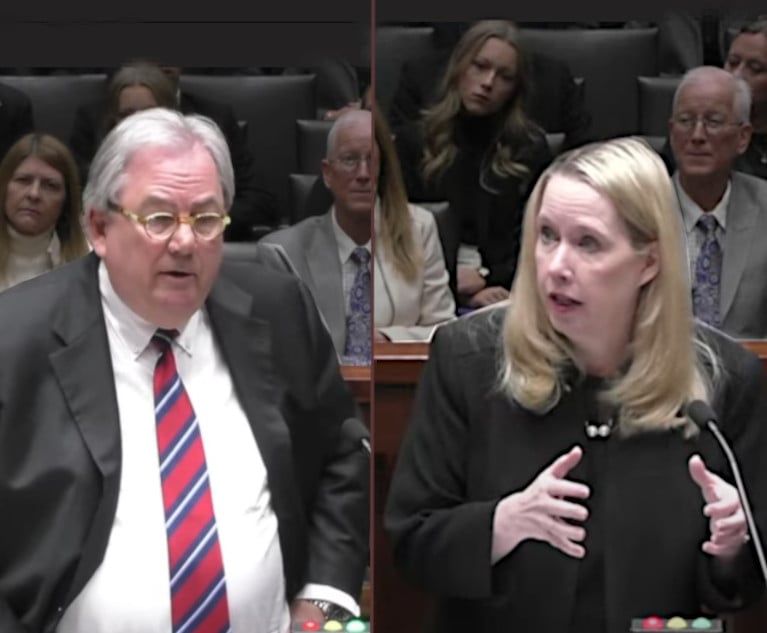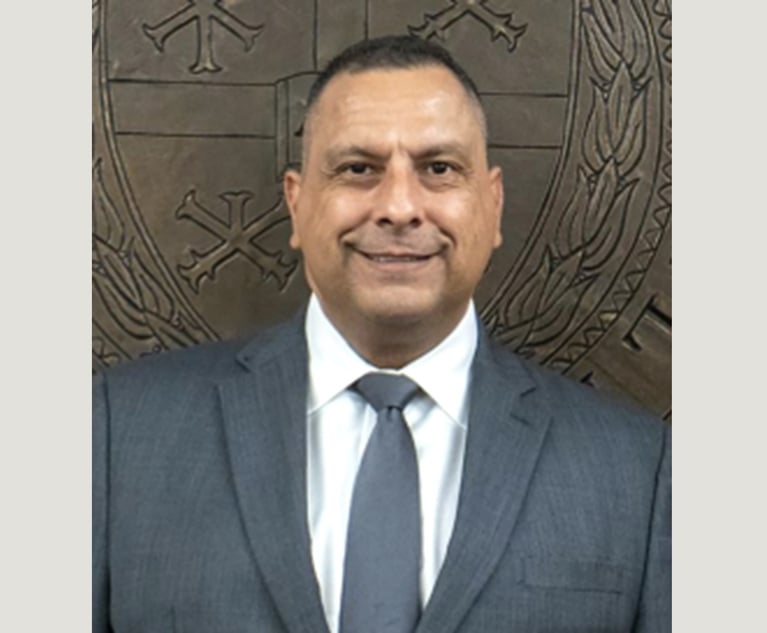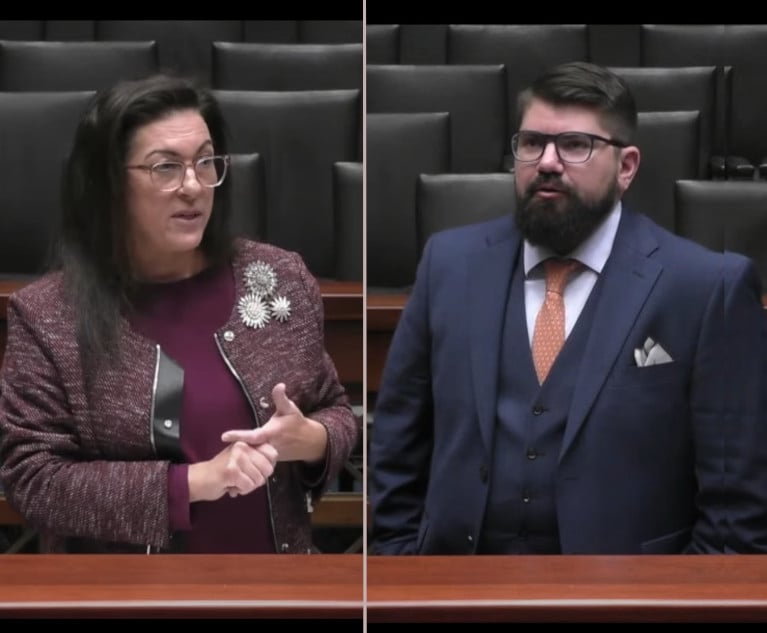Tips for How to Make the Best of Rest Time and How to Know You Need It
Texas law students yearning for rest and relaxation will get a chance later this month, but winter break isn't just a time for leisure.To make…
November 30, 2018 at 06:00 AM
7 minute read

Texas law students yearning for rest and relaxation will get a chance later this month, but winter break isn't just a time for leisure.
To make the most of the monthlong holiday, law students should fit in R&R, while also setting aside time to reflect on the pros and cons of the finished semester, set goals for the upcoming semester and jump-start job searches for summer jobs.
Texas Lawyer connected with a student bar president, a career services director and an academic success expert at three law schools spread across Texas to get their top tips about balancing the break. Here are their answers to our questions, edited for brevity and clarity.
Texas Lawyer: After a hard semester, law students desperately need rest and relaxation over the winter break. What are your tips and advice for fellow law students to truly unplug and recuperate?
Spencer Young, a third-year student at Texas Tech University School of Law in Lubbock and president of its student bar association: Law students face plenty of obstacles in their day-to-day lives during the semester. There is no argument that law students do not just want a break, we often need the break, particularly as 1L students. I have always been one that enjoys staying busy. I'm the type that would go crazy sitting on the couch for the entirety of December. I have worked for the majority of each winter break during law school. However, that is not to say that time off is not important. Each break, whether it be winter, summer or spring, I set aside a couple of days, depending on the length of the break, for “me time.” For me, this can look like a solo hiking trip, a road trip or just a mini-“staycation” doing the things I enjoy.
Texas Lawyer: The day-to-day busy work of law school may keep students from being with friends and family as much as they'd like, but winter break gives them a chance to catch up. For you, personally, how have you seen that reconnecting with loved ones has benefited you?
Young: I think it's safe to say that the majority of law students have fallen behind in their communication to their friends and families at some point during the school year. I know I have more times than I care to admit, and often my excuse is that, “I am too busy.” There has never been a time that I have not felt refilled after breaking one of these stints. I have found that taking time to reconnect with family and friends takes you away from the law school bubble and allows you to return to “reality”—even if it's for a short period. I have found that making time for my family and friends gives me the boost to pick up exactly where I left off at the end of the semester. Moreover, it reminds me of why it is that I do what I do. Remembering why I started helps me keep my sights focused on where I am heading.
Texas Lawyer: What are some of the factors that a student could ponder during his winter break to reflect upon his performance in the fall 2018 semester?
Meijken Westenskow, professor and assistant director of Academic Success and Bar Readiness, University of North Texas Dallas College of Law: Take time to recognize and appreciate your accomplishments to date. Review your work from early in the semester and acknowledge areas where you improved. Think of ways that you can expand on and implement your advancing skills during the next semester. When that becomes boring, as it inevitably will to the quintessential law school overachiever, use the winter break as a stress-free time to reflect on what worked well during your first year and what study habits you can abandon or refine. Now that you have a better idea of what study strategies improved your performance, build upon those strategies throughout the spring semester.
Texas Lawyer: What are examples of great, practical goals that a student could set for her upcoming Spring 2019 semester to improve her education?
Westenskow: Start building your study plan. If you know of important exams or projects for your spring courses, then start to build a study schedule that incorporates those deadlines. Finally, spend some time considering your risk of burnout. What sacrifices did you make to advance your success? Are those sacrifices sustainable during the next few years? Have you experienced any issues with your health or mental health that are attributable to your academic commitments? If so, then consider which commitments you can eliminate and what you need to “add back in” to your schedule to make the next semester more sustainable.
Texas Lawyer: What are some things law students can do over winter break to advance their job searches?
Nazleen Jiwani, director of the Career Resource Center at South Texas College of Law Houston: Our office remains open until the week of Christmas and opens back up Jan. 2, 2019. I encourage students to come and meet with their career services counselor as soon as finals are over to discuss different summer opportunities, work on marketing materials and target employers. While we encourage students to relax and enjoy the holidays, we want them to keep in mind that the winter break is a great time to improve and refine their resumes and send out their application materials to people they want to work for over the coming summer. To break it down, students should use their winter break to draft or sharpen their resumes and cover-letters, apply to summer internships and talk to their career counselors about the best way to target employers.
Texas Lawyer: If they make an appointment with career services, what should they expect to happen?
Jiwani: The assigned career service counselor will evaluate the students' career expectations over the next two-and-a-half to three years of their law school career. The counselor will then discuss summer internships or jobs and their importance, employer or attorney expectations and student expectations. Time is also spent in reviewing marketing materials, which include resumes, cover letters, writing samples and any other document that will be used to apply or interview with. The counselor will also get to know the student to understand their job prospects based on likes, dislikes and personal preferences. They discuss how to target the practice area they are interested in.
Texas Lawyer: How much of the winter break should they spend on job searching vs. relaxing and reconnecting with loved ones?
Jiwani: Many students are still exploring their options, and to those students, I would recommend at least a 50-50 split on relaxing vs. working on their job search. The first semester of law school is quite treacherous, and jumping into the next step of finding a summer internship immediately can be fairly daunting. I definitely think students should take the winter break to relax and refresh their minds in order to hit the ground running once they are back in school after the winter break, as grades play a big role in the job search. However, I am always a proponent of staying ahead of the game.
Angela Morris is a freelance journalist. Follow her on Twitter at @AMorrisReports
This content has been archived. It is available through our partners, LexisNexis® and Bloomberg Law.
To view this content, please continue to their sites.
Not a Lexis Subscriber?
Subscribe Now
Not a Bloomberg Law Subscriber?
Subscribe Now
NOT FOR REPRINT
© 2025 ALM Global, LLC, All Rights Reserved. Request academic re-use from www.copyright.com. All other uses, submit a request to [email protected]. For more information visit Asset & Logo Licensing.
You Might Like
View All
Case With 'Serious Consequences for Corporate Law' Heads to Texas Supreme Court
5 minute read

How Uncertainty in College Athletics Compensation Could Drive Lawsuits in 2025

'It's Like They Lynched You:' Law Professor's Discrimination Claim Reaches High Court
7 minute readTrending Stories
- 1Relaxing Penalties on Discovery Noncompliance Allows Criminal Cases to Get Decided on Merit
- 2Reviewing Judge Merchan's Unconditional Discharge
- 3With New Civil Jury Selection Rule, Litigants Should Carefully Weigh Waiver Risks
- 4Young Lawyers Become Old(er) Lawyers
- 5Caught In the In Between: A Legal Roadmap for the Sandwich Generation
Who Got The Work
J. Brugh Lower of Gibbons has entered an appearance for industrial equipment supplier Devco Corporation in a pending trademark infringement lawsuit. The suit, accusing the defendant of selling knock-off Graco products, was filed Dec. 18 in New Jersey District Court by Rivkin Radler on behalf of Graco Inc. and Graco Minnesota. The case, assigned to U.S. District Judge Zahid N. Quraishi, is 3:24-cv-11294, Graco Inc. et al v. Devco Corporation.
Who Got The Work
Rebecca Maller-Stein and Kent A. Yalowitz of Arnold & Porter Kaye Scholer have entered their appearances for Hanaco Venture Capital and its executives, Lior Prosor and David Frankel, in a pending securities lawsuit. The action, filed on Dec. 24 in New York Southern District Court by Zell, Aron & Co. on behalf of Goldeneye Advisors, accuses the defendants of negligently and fraudulently managing the plaintiff's $1 million investment. The case, assigned to U.S. District Judge Vernon S. Broderick, is 1:24-cv-09918, Goldeneye Advisors, LLC v. Hanaco Venture Capital, Ltd. et al.
Who Got The Work
Attorneys from A&O Shearman has stepped in as defense counsel for Toronto-Dominion Bank and other defendants in a pending securities class action. The suit, filed Dec. 11 in New York Southern District Court by Bleichmar Fonti & Auld, accuses the defendants of concealing the bank's 'pervasive' deficiencies in regards to its compliance with the Bank Secrecy Act and the quality of its anti-money laundering controls. The case, assigned to U.S. District Judge Arun Subramanian, is 1:24-cv-09445, Gonzalez v. The Toronto-Dominion Bank et al.
Who Got The Work
Crown Castle International, a Pennsylvania company providing shared communications infrastructure, has turned to Luke D. Wolf of Gordon Rees Scully Mansukhani to fend off a pending breach-of-contract lawsuit. The court action, filed Nov. 25 in Michigan Eastern District Court by Hooper Hathaway PC on behalf of The Town Residences LLC, accuses Crown Castle of failing to transfer approximately $30,000 in utility payments from T-Mobile in breach of a roof-top lease and assignment agreement. The case, assigned to U.S. District Judge Susan K. Declercq, is 2:24-cv-13131, The Town Residences LLC v. T-Mobile US, Inc. et al.
Who Got The Work
Wilfred P. Coronato and Daniel M. Schwartz of McCarter & English have stepped in as defense counsel to Electrolux Home Products Inc. in a pending product liability lawsuit. The court action, filed Nov. 26 in New York Eastern District Court by Poulos Lopiccolo PC and Nagel Rice LLP on behalf of David Stern, alleges that the defendant's refrigerators’ drawers and shelving repeatedly break and fall apart within months after purchase. The case, assigned to U.S. District Judge Joan M. Azrack, is 2:24-cv-08204, Stern v. Electrolux Home Products, Inc.
Featured Firms
Law Offices of Gary Martin Hays & Associates, P.C.
(470) 294-1674
Law Offices of Mark E. Salomone
(857) 444-6468
Smith & Hassler
(713) 739-1250






